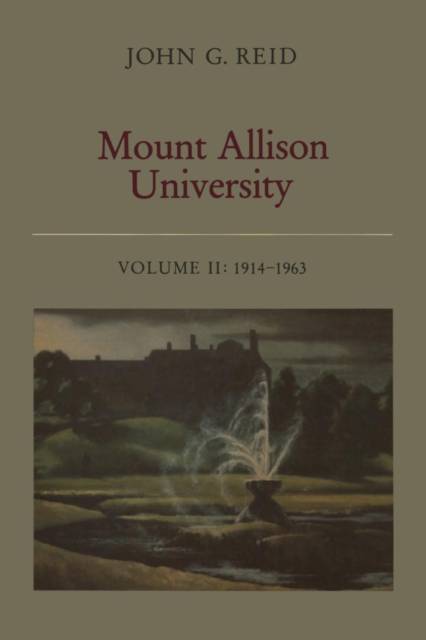
- Retrait gratuit dans votre magasin Club
- 7.000.000 titres dans notre catalogue
- Payer en toute sécurité
- Toujours un magasin près de chez vous
- Retrait gratuit dans votre magasin Club
- 7.000.0000 titres dans notre catalogue
- Payer en toute sécurité
- Toujours un magasin près de chez vous
Description
This two-volume work examines the history of Mount Allison University and its antecedent secondary schools from the earliest years to 1963. Mount Allison's evolution is considered not only for its own internal dynamics but also in the context of the social, economic, and intellectual history of Canada's Maritime Provinces.
Volume II covers the period starting with the outbreak of the First World War. At Mount Allison, as at other Canadian universities, both world wars profoundly affected institutional life. Mount Allison's development was also greatly influenced by the economic struggles of the inter-war years. The Maritime region, having experienced economic fluctuations following the decline of its seaborne trades in the late nineteenth century, emerged after the First World War as an area of persistent economic depression and social dislocation. Mount Allison was faced with the potentially conflicting demands of maintaining intellectual quality, through such means as attracting and retaining faculty members of high competence, while at the same time obeying the Christian obligation (influenced by the social gospel movement within the Methodist denomination and its successor, the United Church of Canada) to make education widely available at low cost.
This dilemma persisted into the post-Second World War era at Mount Allison, when the brief but eventful period during which the campus was crowded by veteran students was followed by smaller enrolments and a search for financial support in order to maintain academic standards. Although the late 1950s and early 1960s brought fundamental changes in the form of new sources of funding, expansion of facilities, and changed attitudes among students and faculty, the central dynamic of Mount Allison's history remained one of struggle to reconcile responsibilities -- intellectual, moral, social -- which could not easily be reconciled.
.Spécifications
Parties prenantes
- Auteur(s) :
- Editeur:
Contenu
- Nombre de pages :
- 546
- Langue:
- Anglais
- Collection :
Caractéristiques
- EAN:
- 9781487581343
- Date de parution :
- 15-12-84
- Format:
- Livre broché
- Format numérique:
- Trade paperback (VS)
- Dimensions :
- 156 mm x 234 mm
- Poids :
- 830 g

Les avis
Nous publions uniquement les avis qui respectent les conditions requises. Consultez nos conditions pour les avis.






